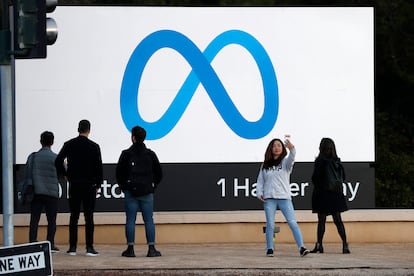Tech giants sued over mental health crisis among youth in US
The 90-page complaint says the social media companies have designed and marketed their products to children, worsening mental health and behavioral disorders including anxiety and depression

The public school district in Seattle is the latest to join an offensive against the tech giants behind TikTok, Instagram, Facebook, YouTube and Snapchat, which are being accused of causing the mental health crisis among youth in the United States.
The 91-page complaint, filed by Seattle Public Schools on Friday in US District Court, says the social media companies have created a public nuisance by targeting their products to children.
“Defendants have successfully exploited the vulnerable brains of youth, hooking tens of millions of students across the country into positive feedback loops of excessive use and abuse of Defendants’ social media platforms,” the complaint said. “Worse, the content Defendants curate and direct to youth is too often harmful and exploitive.”
“Schools are struggling not only to provide students with mental health services, but also to deliver an adequate education because of the youth mental health crisis,” added the lawsuit from Seattle Public Schools, which represents a hundred schools with nearly 50,000 students.
The complaint accuses the tech companies of putting profit before the mental health concerns of youngsters. “Defendants have intentionally cultivated, creating a mental health crisis among America’s youth,” the lawsuit said. “Defendants have done so for profit. Their business models are based on advertisements. The more time users spend on their platforms, the more ads Defendants can sell.”
The school district argues that young people are more vulnerable to the social media’s “manipulative conduct” as their brains are not fully developed, and they consequently lack the same emotional maturity and impulse control as adults.
The complaint also notes that school vandalism has increased as a result of social media trends such as the 2021 TikTok challenge known as devious lick, which encouraged students to post videos of themselves stealing school property and vandalizing the premises. More recently, school nurses had to attend to dozens of students with abdominal pain who took part in the World’s Hottest Potato Challenge.
The lawsuit claims that the mental health crisis has hampered student performance in the classroom and led to a sharp rise in chronic absenteeism, which, in turn, increases the risk that they will succumb to substance abuse and drop out of school. The district says it does not have adequate resources to address the mental health crisis, and want the tech companies to be held accountable for the situation and provide a long-term solution.
In 2018, suicides became the second leading cause of death among 10 to 24-year-olds in the US. Some studies link this crisis to social media, although the cause-and-effect link has not yet been established. In recent years, two in 10 students have also admitted to having suicidal thoughts. At the end of 2021, the National Academy of Pediatrics declared a national emergency after witnessing “soaring rates of mental health challenges among children, adolescents and their families.”
Kent County has also joined the Seattle lawsuit. In August 2022, the local council approved a $5-million budget to address the mental health crisis. Similar lawsuits are being filed in federal courts across the US, according to Axios. In February, the Northern District of California is set to file a new complaint that argues that platforms such as Instagram are “addictive by design.”
The lawsuits against the tech giants are being compared to the landmark cases brought against tobacco companies in the 1980s and, more recently, against the pharmaceutical companies over their role in the opioid crisis. The plaintiffs are hoping to change the design of social media platforms and strengthen the conditions of use. The big question is whether these platforms and their algorithms can be considered products, in the same way a cigarette is, and whether tech companies can be held accountable for harm caused by these designs.
Meanwhile, the Louisiana government has recommended that schools ban TikTok, which is owned by the Chinese company ByteDance. In this case, the ban is due to concerns over the company’s privacy policy and security. Louisiana is also one of many states to block the video app from government devices.
Last September, California also passed a landmark law to increase online protection for kids. The regulation, which will take effect on January 1, 2024, requires online platforms to consider the best interest of child users and to default to privacy and safety settings that protect children’s mental and physical health and wellbeing. Companies that intentionally violate the new regulations will be fined $7,500 for each minor affected.
On Tuesday, Meta, the parent company of Facebook and Instagram, announced that from February teenagers will only receive ads based on their age and location. “We are removing gender as a targeting option,” the company said in a blog post.
Sign up for our weekly newsletter to get more English-language news coverage from EL PAÍS USA Edition
Tu suscripción se está usando en otro dispositivo
¿Quieres añadir otro usuario a tu suscripción?
Si continúas leyendo en este dispositivo, no se podrá leer en el otro.
FlechaTu suscripción se está usando en otro dispositivo y solo puedes acceder a EL PAÍS desde un dispositivo a la vez.
Si quieres compartir tu cuenta, cambia tu suscripción a la modalidad Premium, así podrás añadir otro usuario. Cada uno accederá con su propia cuenta de email, lo que os permitirá personalizar vuestra experiencia en EL PAÍS.
¿Tienes una suscripción de empresa? Accede aquí para contratar más cuentas.
En el caso de no saber quién está usando tu cuenta, te recomendamos cambiar tu contraseña aquí.
Si decides continuar compartiendo tu cuenta, este mensaje se mostrará en tu dispositivo y en el de la otra persona que está usando tu cuenta de forma indefinida, afectando a tu experiencia de lectura. Puedes consultar aquí los términos y condiciones de la suscripción digital.








































